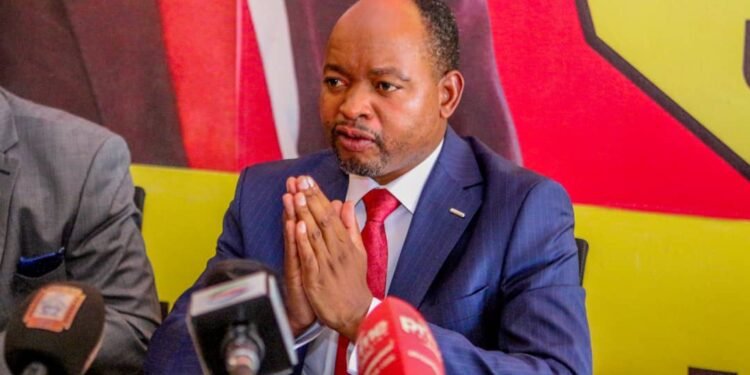UPND 2027 promises just hollow propaganda
By A Special Correspondent
CORNELIUS Mweetwa’s recent assertion that the cost of living will miraculously scale down by 2027 is a transparent attempt to hoodwink a beleaguered nation with political fairy tales. This claim, based on the flimsy premise that “the cost of living is informed by the cost of production and the availability of goods and services” is nothing more than a desperate political ploy aimed at distracting the public from the government’s chronic inability to deliver tangible results.
For the past three years plus, citizens have borne the brunt of economic mismanagement, while the ruling party has repeatedly failed to address the spiraling hardships that have become a part of everyday life. Now, with the looming elections in 2026, it is clear that these promises are crafted solely for electoral gain.
The narrative spun by Mweetwa at the recent press conference in Lusaka smacks of naivety and willful ignorance – a calculated attempt to manufacture hope where there is none. When the government claims that we can look forward to a future of relief from the crippling cost of living, it conveniently ignores the harsh reality of stagnant economic policies and the persistent failure to implement reforms that benefit ordinary Zambians.
The argument that lowering production costs and increasing the availability of goods will somehow trickle down to ease the daily burden on families is a gross oversimplification of a complex crisis. It is a narrative that conveniently shifts responsibility away from policymakers who have consistently prioritized political expediency over the welfare of the people.
The citizens of Zambia are far too aware of the empty rhetoric that has been peddled for years. The promise of a better tomorrow – set in a vague, far-off year – is a familiar tactic used to placate a frustrated electorate. Yet, history has shown that these assurances are nothing but smoke and mirrors.
The government’s track record of failing to deliver any meaningful improvements over the last half-decade is a stark reminder that such predictions are baseless. The economic policies in place have repeatedly resulted in the erosion of purchasing power and a widening gap between the ruling elite and the suffering masses.
To claim that the cost of living will suddenly ease its relentless grip is not only unrealistic – it is an insult to the very intelligence of the Zambian people.
This statement is emblematic of the ruling party’s larger strategy: a calculated campaign designed to manipulate perceptions and secure political leverage ahead of the 2026 elections. By invoking the promise of future relief, Mweetwa and his cohorts are attempting to rewrite a narrative that glosses over years of neglect and economic decline. They are banking on a populace desperate for change, yet unaware of the historical pattern of broken promises. The timing of this announcement is no coincidence – it is a deliberate move to create a false sense of optimism, distracting the public from the ongoing failures of a government that has continuously neglected its core mandate of serving the people.
For a nation mired in economic distress, such rhetoric is not only misguided – it is dangerous. It serves to obfuscate the urgent need for concrete policy changes and reforms. Instead of confronting the structural issues that have led to runaway production costs and a volatile market, the government opts for a strategy of deflection, leaning on optimistic forecasts that lack any substantive backing. This approach is tantamount to political manipulation, designed to placate a population in crisis while the powers that be continue to operate with impunity.
The electorate has grown weary of these hollow promises. The Zambian people, informed and resilient, are not the naïve masses that can be swayed by abstract forecasts and grandiose projections. They demand accountability, transparency, and immediate action – not a deferred promise of improvement that conveniently falls after the next election cycle. The time has come for a reckoning: for citizens, political analysts, and governance activists alike to call out this blatant attempt at deception and to demand real, immediate solutions to the economic calamity that has been allowed to fester under incompetent leadership.
In the face of mounting hardships, it is imperative that the public scrutinises every word uttered by those in power. The assurance of a better cost of living in 2027 is a stark reminder of the government’s disconnect from the reality on the ground – a reality marked by soaring prices, dwindling resources, and a growing sense of abandonment. The promise of future relief is nothing but a mirage, a desperate attempt to deflect criticism while the status quo continues unabated. The Zambian people deserve more than empty platitudes and unfulfilled promises; they deserve a government that is willing to tackle the deep-seated issues head-on, rather than one that cloaks its inaction in the guise of hopeful forecasts.
As the 2026 elections approach, the citizens of Zambia are more vigilant than ever. They recognise the United Party for National Development (UPND) propaganda for what it is – a smokescreen intended to mask the government’s failures. The time for blind optimism is over.
It is time to demand change, to insist on policies that address the real challenges at hand, and to reject the notion that a few years of delayed relief can make up for years of economic mismanagement.
The future of Zambia depends on our collective refusal to be placated by political spin and our unwavering commitment to demanding a government that truly prioritises the well-being of its people.
The author is a social commentator.

























